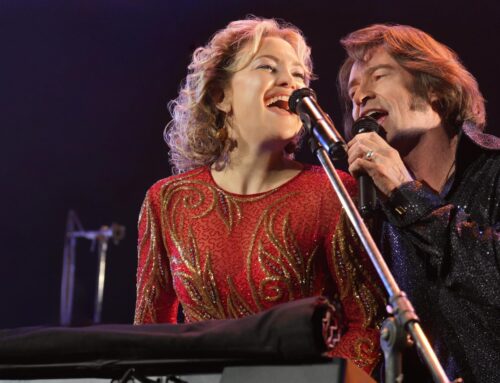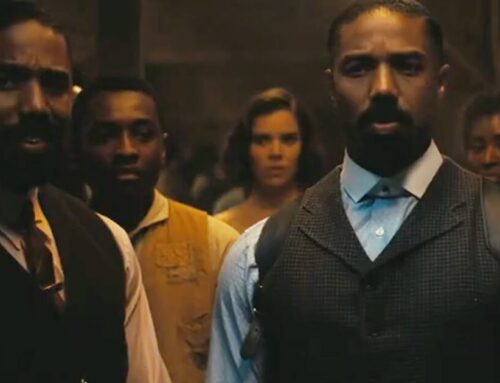J.EDGAR– Clint Eastwood’s latest directorial effort–is a mess from every point of view with the exception of Leonardo DiCaprio. He is one brave actor. As J. Edgar Hoover– the creator and first chief of the Federal Bureau of Investigation– DiCaprio survives despite layers of makeup, a melodramatic jumble of a script, bad accents, and tonal vagrancy. I had no idea what I was supposed to think, feel, or know for sure about one of the most puzzling characters in the history of these United States. Eastwood’s hamfisted direction kills any possibility of our caring about Hoover, and we are left adrift in a sea of criminally awkward scenes. DiCaprio somehow manages to cleave to some layer of authenticity in the part; his performance grew on me and in one scene achieved an almost rueful poignancy.
Where to begin. I wish Eastwood had begun at the beginning. Ever since PULP FICTION propelled its storytelling every which way to powerful effect, every filmmaker thinks scrambling the chronology of a story is a great idea. Here it’s pointless and confusing. This tale of J. Edgar’s private life and public rise to fame is framed as a series of discombobulated flashbacks, recounted as he’s dictating his story to an assortment of attractive, well-groomed, young male typists. More about that shortly..
The man who emerges is a rigid mama’s boy–and who can blame him when mama is played by the always authentic and, even here, sympathetic Judi Dench. She’s a steamroller, baby– and her son, John Edgar, struggles to stay upright. Heaven forbid he turns out like his father, an obviously demented old man whom we glimpse careening wild-eyed around a corner. No sir; her “Edgar”– as she calls him– is going to be GREAT.
What mom doesn’t know is that her boy, who will spend the rest of her life living at home, doesn’t really like women. Mom makes it clear in one pivotal scene: she’d rather him dead than be one of “them.” Thus, we come to understand that J. Edgar’s fanatic devotion to law and order is his attempt to conquer his self-loathing, and root out his– and everyone else’s wayward impulses, everywhere. He will monitor crime and stamp out corruption wherever it lurks. That means communism, the mob, those randy Kennedys, Martin Luther King.
No such luck on the personal front. Enter THE SOCIAL NETWORK’s Armie Hammer (from the Winkle-vi to the FBI) as the very pretty Clyde Tolson. Tolson becomes J. Edgar’s second in command– and it’s beginning to look a lot like Brokeback Bureau. Whereas director Ang Lee had an extraordinary feel for how two men might sexually and emotionally connect, Eastwood directs this relationship as if it were a 30’s soap opera. They shop together, plot together, and have a fox to trot together; they fall in love– but it’s never explicit until one pivotal scene where they fling their martinis, have a knock-down row –and a kiss; the scene plays like one big hissy fit. I was squirming in my seat as the audience howled and groaned.
As the two grow old together, Hammer’s makeup grows more and more hideously artificial, until he emerges looking like a giant speckled egg– with similar emotive capabilities. The last scene finds Tolson, practically mummified, weeping over a man who has been revealed as a fussy little paranoid liar, willing to accuse even his longtime “pal” of disloyalty. As the maudlin music rose on the soundtrack– signaling the tenderness of the aging couple’s affections– my dinner rose to my throat.
The rest of the cast does its best. There’s Naomi Watts who plays Hoover’s long-suffering, unmarried, personal secretary and keeper of secrets–Miss Gandy. Once she held a glimmer of attraction for him and he took her on a wild date to the library where he dazzled her with the card catalogue system he’d created!! (I have no idea if this really happened–but I hope it did!) Poor Naomi spends the rest of the movie getting older, entering and exiting rooms– Kramer-like–the look of growing consternation on her face competing with increasing layers of latex and pancake.
There ‘s also a cornucopia of historic figures in brief cartoony episodes– people like Robert Kennedy, Richard Nixon, Emma Goldman, Shirley Temple– with no context. The film assumes much prior knowledge; anyone under 50 who doesn’t know his American history and Ginger Rogers– is going to think there’s a reel missing. (That’s when movies used to be shot on film.) The Lindbergh baby kidnapping is dwelled on, but it’s never made clear why the verdict in that case was so controversial, and what connection that has to Hoover’s intolerance.
I did pick up some interesting bits of information: 1) Hoover’s psychological ticks were probably the reason for the development of real science to solve crimes. Who knew he was the father of forensics and the godfather of shows like CSI MIAMI? 2) Hoover may have also really worn a dress, and in one of the movie’s few effective scenes, DiCaprio makes Hoover seem tender, real, and tragic. But nothing will save J.EDGAR from it’s ultimate destination: high camp. Look for showings at midnight as “J.EDGAR: The Rocky Hoover Picture Show.”






Leave A Comment
You must be logged in to post a comment.